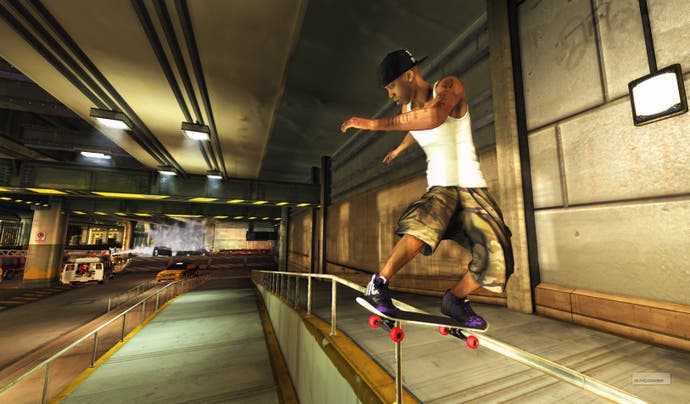Tony Hawk: RIDE
Thin ice.
Plus, you can't help wondering why there are one or two pointless NPCs meandering round every level. They're not carrying skateboards or anything. They're just random characters - a woman in a bikini, a man wearing a rucksack - who enjoy strolling around skate parks and getting annoyed when they are nearly run over by skaters. They wait till the very last moment to jump out of your way, then look inexplicably surprised and shake their fists at you. Why don't they just go for a walk in a normal park? Still, it's good to know the characters from Crazy Taxi are still getting work.
It might have been possible to overlook all this if the gameplay was good enough to hook you into RIDE. And if it was 1999. But it isn't. The fundamental problem is that the skateboard peripheral, for all its sturdiness, doesn't work properly.
You'll realise this once the novelty of riding around on a plastic skateboard wears off and you start trying to do specific tricks. The game is incapable of registering your moves on the board consistently. Ollies and nollies are easy to pull off, once you get used to the slight lag, but that's about it. Tilt tricks are constantly registered as flick tricks and vice versa.
To perform more complex moves you'll need to watch the tedious, unhelpful instructional videos as there's no in-game help. The manual isn't any use at all - it doesn't even contain a list of the tricks you can do, let alone details of how to perform them.
Then there are those infrared sensors. They're supposed to register hand movements so you can perform grabs and finger flips. They actually do this once every twentieth attempt. If you're lucky. Even when the little indicator on the screen shows the sensor has registered your movement, nothing seems to happen in-game. In short, the sensors are pointless. Activision might as well have stuck on a set of old bottlecaps or some nice shiny beads.

Despite the skateboard's failings it's easy to race through the first batch of Speed challenges on the Casual setting. You're on-rails anyway, so it's just a matter of performing ollies to pick up time bonuses and avoid penalties. It's also possible to win the initial Trick missions without any trouble - simply waggle away on the board with wild abandon to perform random tricks and rack up massive high scores.
The Challenge levels are more difficult as they require you to pull off specific moves, and those who aren't veteran skateboarders will have to go through the tutorial videos to find out what many of these are. The videos are of little use though, being so vague and limited you still often end up with no idea what the game wants you to do.
Even if you're familiar with skateboarding terminology you might struggle to work out the exact moves required. And regardless of your real-life skills, as you unlock new areas, and missions of all types get harder, the constant battle to make the game understand what you're trying to do becomes a serious problem.
All of the above applies in Casual mode - the easiest difficulty setting. Switch to Confident, where you also have to steer the board, and RIDE becomes almost unplayable. Once again the skateboard struggles to recognise commands, constantly confusing gentle and sharp turns. Simultaneously pulling off tricks and jumps while trying not to swerve wildly all over the place is a tall order. It does get easier with practice but it doesn't get any more fun.



